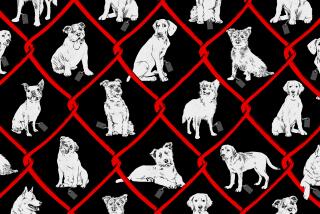Book review: ‘The Puppy Diaries’ by Jill Abramson
- Share via
Jill Abramson had me at “woof.” How could I not read something titled “The Puppy Diaries”?
But I was also prepared to feel seduced just by a puppy-porn-adorable cover photo of Scout, the heroine of “The Puppy Diaries.” What if the book turned out to be nothing more than an oochy-coochy paean to the author’s pup? Any dog parent could write that. Maybe this one had made it between hard covers only because Scout’s “mom” happens to be the new executive editor of the New York Times.
I was also bracing to be ticked off. Darling little Scout was a purebred British standard golden retriever, and she probably cost a bundle — Abramson wrote that her husband “put down a deposit toward the price.” Like thousands of dog lovers, I rescue perfectly wonderful shelter dogs who’ve been dumped and abandoned. I know purebred fans love their guys, but I can’t shake the belief that almost every time a dog is bought or sold, it means there is another dog in a shelter who doesn’t get adopted.
Then I read the book. That Scout is a doll, all right, but Abramson lives up to her résumé as one, um, dogged journalist. You can’t keep the reporting out of her work any more than you could keep the naughty-puppy moments out of Scout.
As for the ticked-off part, Abramson shares my angst. Her husband’s heart is set on this breed. With 3 million to 4 million dogs put to death every year in the country, Abramson “felt guilty … and with local animal rescue groups actively looking for new homes for goldens who were given up or mistreated … how could we justify getting a new puppy?” Some of Abramson’s friends “reacted as if we were buying a Hummer.” It seems, she writes with fine understatement, “that almost every aspect of dog ownership has fierce, partisan battles lurking just below the surface.”
I’m still not sold on the dog-selling, but this is Abramson’s and Scout’s story, not mine. What Abramson has delivered is both a diary and a guidebook of Scout’s first year. It shares so many fears, frustrations, misapprehensions and joys with child-rearing that you could drop a kid’s name in some passages instead of “Scout” and it would make perfect sense.
“Diaries” is Abramson’s quest to bring up Scout properly and positively. It was first laid out in a New York Times blog series, and like any quest, the journey teaches the quester as much as reaching the goal. Scout teaches Abramson about her strengths and fears. Abramson sees her fellow New Yorkers through Scout’s eyes — like the “snobbishness” of some dog people, on display at a local dog run. For a writer, she learns volumes about nonverbal communication, Scout-style. The book’s most useful sections are the diaristic, moment-by-moment setbacks and exhilarations, and Abramson’s push-back against the omniscient dog-rearing manuals, so full of certainty about the author’s expert method. Abramson and Scout try virtually all of them, from clicker training to choke chains.
With her NYT chops, Abramson gets to interview animal behaviorist Temple Grandin and takes Scout to meet dog trainer Cesar Millan. “In the end,” Abramson writes, “the truth seemed to be that no single training approach consistently worked for us.”
“Diaries” has no shortage of the diminuendo “awwww” moments of every dog person, and the book also asks the right questions of readers because Abramson first asked them of herself — what kind of dog suits your circumstances? What about pet insurance? Exercise? Is the best dog food always the most expensive?
Here’s where I’m afraid the book could intimidate novices and not very rich potential dog “parents.” Abramson and her husband are well-off empty-nesters. They have a Manhattan apartment and a country place in Connecticut. With almost desperate frequency, she acknowledges how lucky her family is to be able to afford doggy day care and training and refresher courses — once, Abramson’s husband flew to California for a ClickerExpo training seminar in Newport Beach. I had to wonder whether Scout was getting a better equivalent education than many American school kids.
That’s a very lofty bar to set, even if only by writing about it. If it makes potential and potentially good dog people feel they’re not good enough to bring home a dog — and it really should not — then a lot of good dogs and a lot of good people would be missing out on an awful lot of happiness.
(I’d like to thank my dog Daisy for allowing me to finish reading this book without her turning it into a chew toy. Although, like Scout, she has matured. My Daisy now shreds only books printed before 1950.)
More to Read
Sign up for our Book Club newsletter
Get the latest news, events and more from the Los Angeles Times Book Club, and help us get L.A. reading and talking.
You may occasionally receive promotional content from the Los Angeles Times.







